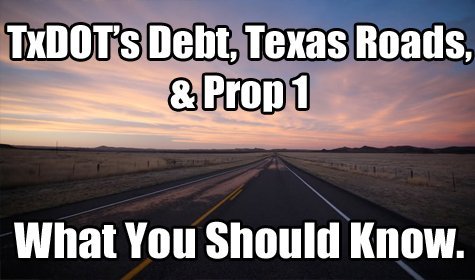The Texas Transportation Funding Amendment, Proposition 1 is on the November 4, 2014 general election ballot in the state of Texas as a legislatively-referred constitutional amendment.
The measure would divert half of the general revenue derived from oil and gas taxes from the Economic Stabilization Fund (ESF), also known as the Rainy Day Fund, to the State Highway Fund for the purpose of providing transportation funding for repairs and maintenance of public roads. It’s anticipated that this will result in approximately $1.2 billion per year going toward transportation funding instead of the Rainy Day Fund. If approved, the measure would take effect immediately, once the votes are certified, and would apply to transfers the comptroller made after September 1, 2014.
The Rainy Day Fund, was established by voters in 1988. The fund allows the state to save money and allocate excess revenue that can be used during times of financial stress. It can assist in balancing the budget, safeguard against unexpected economic downturns and prevent states from slipping into a deficit. Each year, the fund receives revenue from 75 percent of any oil and gas production taxes that are greater than the amount collected in fiscal year 1987. It also receives half of any balance remaining in the general revenue fund at the end of a fiscal biennium.
The State Highway Fund, also known as Fund 6, finances highway needs by gathering revenue from federal reimbursements, state motor fuel taxes, vehicle registration fees and other general fees.[3] If Proposition 1 is approved, it’s estimated that the State Highway Fund will receive approximately $1.2 billion annually from oil and gas taxes formerly appropriated to the Rainy Day Fund.
The official ballot title will appear as follows:
| “ | The constitutional amendment providing for the use and dedication of certain money transferred to the state highway fund to assist in the completion of transportation construction, maintenance, and rehabilitation projects, not to include toll roads. |
Texas needs $4.6 billion annually to maintain and fund the current road and bridge budget. This is the highest in the nation according to polls.
If approved by voters, Prop 1 lessens that burden without new taxes, tolls or fees – that can only be used for construction, maintenance, rehabilitation, and acquiring right-of-way for public roads. These funds cannot be used for toll roads. HB 1, a related bill that was also approved by the Texas Legislature in 2013, put these requirements in place.
Prior to 2000 Texas was pay as you go with its state highways. Starting in 2001, Texas started borrowing money for new road construction, pushing that cost onto future taxpayers. By 2011 the debt had grown from zero to $11.9 billion. Currently, Texas is $23 billion in debt and will spend $31 billion over the next 20 years to retire that debt.
Arguments
The House Research Organization published a focus report examining Proposition 1. The following are excerpts from the report detailing arguments in support of the measure:
| “ | Proposition 1, in combination with its enabling legislation, HB 1 by Pickett, would take a key step toward securing critical funding for transportation projects in Texas. While far from a cure-all, the proposed resolution would present a viable means to secure a portion of the funding Texas needs to maintain roadway congestion at current levels, given population and economic growth.Proposition 1 would dedicate an additional, much-needed funding stream to constructing and maintaining public, non-tolled roads. If approved, the amendment would represent a departure from relying on debt and toll roads as primary mechanisms for funding highways.While Proposition 1 would authorize a dedicated funding stream for transportation projects, it also would allow the Legislature to take necessary means to ensure a minimum balance in the rainy day fund was available to respond to natural disasters and fiscal emergencies. HB 1, the amendment’s enabling legislation, calls for the appointment of a House Research Organization Page 3 committee of legislators to determine a sufficient balance for the rainy day fund under which no general revenue would be transferred to Fund 6.Proposition 1, in combination with HB 1, would provide an assurance that a sufficient balance remained in the rainy day fund, while granting each Legislature license to address the needs of the time.
Contrary to claims otherwise, dedicating a revenue stream for key transportation infrastructure would help the state retain its strong credit rating. Instead of insisting on a particular number or percentage in reserve, credit rating bureaus look for a balance between maintaining a healthy amount in reserve for unexpected events and using reserve funds for critical needs such as infrastructure and water. Proposition 1 would strike this balance by appropriating funds for transportation only when there was a legislatively determined substantial balance in reserve for emergencies.[5] |
” |
| —House Research Organization. | ||
Opposition
Arguments
The House Research Organization published a focus report examining Proposition 1. The following are excerpts from the report detailing arguments against the measure:
| “ |
|
” |
| —House Research Organization. | ||

